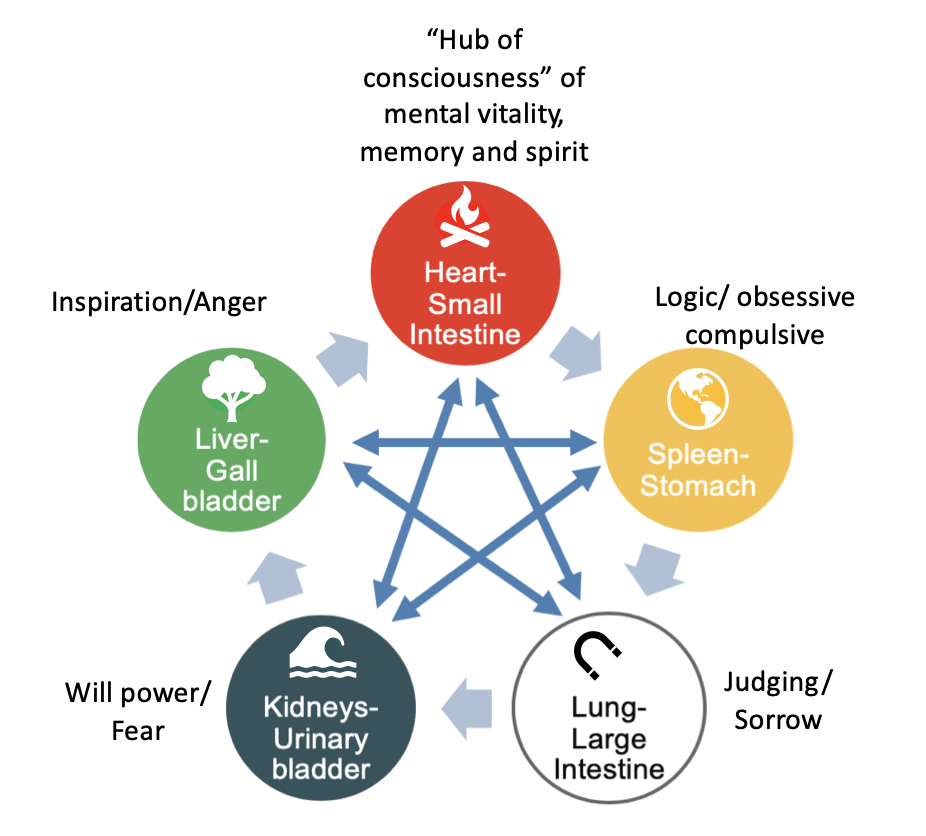Integrative Health Tips – PART 1 January 29, 2021 taotohealth Previous Post In my last two blog posts, Anxiety from an Integrative Health Perspective and YIN YANG and Your Health, I discussed the connection between our physical and mental/emotional health. There’s a saying that form follows (or supports) function, and in the case of integrative or holistic health, the same is true with the inverse, function supports form. Frank Lloyd Wright also affirmed “form and function should be one, joined in a spiritual union.” Gersema E. (2019). A good night’s sleep may be in sight [Internet]. Los Angeles: USC Dornsife. Retrieved from: https://dornsife.usc.edu/news/stories/2999/researchers-to-develop-new-sleep-disorder-treatments In regards to health, function includes optimal mental and emotional resilience that supports form or physical well-being. When unresolved emotions and thoughts such as anger and fear linger and consume most of our waking moments, we inadvertently raise the sympathetic response which elevates our heartbeat, impedes digestion which in turn causes digestive issues, insomnia, as well sexual and reproductive issues which depend on a balance between the sympathetic and parasympathetic responses. Such physiological responses are absolutely necessary given the appropriate time and place. But it becomes problematic when these responses are constant and can’t be turned off producing a vicious cycle. In this post, I’ll provide some suggestions to help improve your health to help break the vicious health cycle – both from a physical and functional perspective. First of all, we need to prioritize health areas we need to improve and regulate. My suggestions are not exclusive in any way, but these are health focus areas I grew up hearing from my Korean elders who understood the importance of Yin Yang health principles, the importance of regulating the following: Emotions/thoughts Sleep Nutrition (input) Elimination (output) Ergonomics/posture (yes, ergonomics) The emotional and mental realm is the most elusive and challenging to address. However, the first step is to identifying there is an imbalance that needs to be corrected. Since there are other professionals who are well-versed and better trained in this subject area, I recommend reading or listening to the works of Dr. Jordan Peterson, clinical psychologist, and Dr. Bruce Lipton, biologist, who have great insights about the interplay between the mind and body. Dr. Peterson has a great understanding of not just modern psychology but also of world philosophies and ancient wisdom. If you are unfamiliar with Dr. Peterson and Dr. Lipton’s work, I highly recommend them both. 12 Rules to Life, Jordan Peterson The Biology of Belief, Bruce Lipton So, let’s begin with improving sleep. Some people are inclined to be night owls. It’s best to follow the natural cycle of the sun and moon as our biology also responds to light. Don’t expect to follow all these suggestions. You can start with ones that work for you so you get “quality” sleep and not necessarily more hours of sleep. Go to bed at the same time and wake up at the same time regularly. Our body functions optimally with routine. Keep your bedroom dark. Turn off or reduce lights from electronic devices. Use black out curtains. Avoid stimulants like coffee, tea, chocolate, and sugar after 1pm (or earlier). Avoid alcohol and cigarettes before bed. Alcohol interferes with deep sleep even if it initially helps you fall asleep. Exercise daily, but it’s best to do in the morning or mid-day, not right before bed. Wear light socks to bed in the summer and heavy socks in the winter. Warm feet can promote good sleep, especially in the winter. A warm foot soak will also help induce sleep. Eat dinner at least 3 hours before going to bed. Ideally, dinner should be your smallest meal, breakfast your largest meal of the day, and lunch is the average size of breakfast and dinner. Have protein for dinner as it will help stabilize blood sugars until morning. Develop a pre-bedtime routine to help calm your nervous system. For example, after brushing your teeth, do some gentle stretches followed by a few minutes of prayer or meditation. Share this article: Health Tips Related Tags anxietyBruce Liptonemotional healthgut healthinsomniaJordan Petersonmind-bodysexual reproductive healthYin yang Previous Post
ANXIETY: From an Integrative Health Perspective June 24, 2020 taotohealth Previous PostNext Post It is not the strongest of the species that survives, nor the most intelligent; it is the one most adaptable to change. Charles Darwin Stress-induced anxiety is at an all-time high throughout the world as the covid-19 pandemic is reshaping our society and erasing any sense of normalcy. Every aspect of life is literally in flux creating change and uncertainty. From an Eastern perspective, the five phases or five elements principle is used to help us understand and manage changes. The 5 phases principle explains how qi cycles through the five stages/phases of transformation based on the cyclical patterns of change in natural phenomena as seen in the seasonal cycle. The 5 phases can help us understand and manage our emotions. The diagram below shows the emotions that usually correspond with each of the five phases (Fire, Earth, Metal, Water, Wood). You’ll see there are two different “emotions” for each phase. For instance, inspiration and anger correlate with the wood phase. When the mind and body are aligned, balanced and adaptable, inspiration springs forth. When the body and mind are out of balance or emotions become excessive and static; the emotion of anger may ensue rather than inspiration. Or when thoughts become obsessive, or we worry too much, excessive emotions can disrupt digestion or lead to a sense of suffocation causing panic attacks. For people who tend to be more extroverted, the stress and anxiety from being locked down may be more intense. Here are some simple ways to help manage stress that are FREE: Turn off the news The news and social media bombard the mind with information that focuses on the past or speculates on the future. The mind chatter grows louder and the mind becomes restless, creating a body-mind imbalance where obsessive thoughts can lead to anxiety, negative emotions and sleepless nights. So, unplug from the news and social media buzz. Limit the time you spend consuming news. Be Sensible—Use your senses Spend more time on activities using your five senses (see, smell, hear, touch and taste) to get back into the present reality and back into your body. Really focus on each of the senses to ground you. Look for signs of the natural world—grass, tree, clouds, the moon, birds flying… Smell the aroma of your favorite drink Carefully listen and identify all the surrounding noises; or listen to your favorite song Touch/feel the texture of your skin or your favorite shirt Taste and enjoy the bite of your favorite dish This exercise gives a visceral reminder that you are alive and well. Stay Connected Reach out to someone you care about and who cares about you. They are only a phone call away. Time spent communicating and sharing experiences can give you the emotional and mental support to weather through these challenging times. And it’s gratifying to know that you can give moral support by listening compassionately. If you’d like more natural health tips, subscribe to our updates! Share this article: Integrative Health Perspective Related Tags 5 elementsanxietycovid-19emotionsmanage stressmind body Previous PostNext Post


